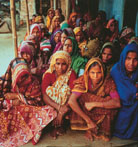
27 Dollars: Banking for the Poor 2000
Distributed by Filmakers Library, 124 East 40th Street, New York, NY 10016; 202-808-4980
Produced by Joost de Haas Mediaproductions
Directed by Andrea Beretta
VHS, color, 61 min.
College - Adult
Asian Studies, Economics
Date Entered: 12/10/2003
Reviewed by Michael J. Coffta, Business Librarian, Bloomsburg University of PennsylvaniaIn 1972, Muhammad Yunas, a Bangladeshi Economics professor, observed the hardship of this country’s poor who worked for as little as 2 cents per day. These impoverished cottage industry workers would borrow money from corrupt local distributors who would (1) sell the worker’s wares, forbidding them from using alternate buyers, and (2) pay the workers obscenely low wages to prolong the debt. After visiting 42 households, Yunas concluded that a combined sum of US$27 loaned to these families would free them of their obligation to the local distributors, a condition he called “slavery.” The results of these small loans enabled all 42 households to seek competitive prices for their goods and to start rudimentary businesses.
In 1976, Yunas founded the Grameen Bank to offer more micro-loans on a broader scale. In 2000, Grameen Bank had 2.6 million clients. The bank even distributes mobile phones to help the people manage their businesses. The outcomes are remarkable. Through interviews and samples of daily life, this film demonstrates the perfectly profound effect these tiny loans have on the Bangladeshi people. Viewers of the film witness the transformation of these people from destitute to upstart entrepreneurs. These people are by no means wealthy due to their businesses, but the autonomy and extra income afford them the opportunities to acquire more tools, livestock, etc. and send their children to school. On the basis of its success in Bangladesh, this banking model has been adopted by 56 other countries, which are listed at the conclusion of the film.
This is a terrific film about a simple, but highly constructive and benevolent, innovation and its deep effect on Bangladesh. One criticism of the film is that the interviews are a bit lengthy. While a great deal of detail is supplied in these interviews, the duration makes the entire film less intense than it could have been.